2019-2020年牛津上海版英语一年级上册巩固辅导九十
2019-2020年小学四年级上册英语牛津上海版复习巩固十二
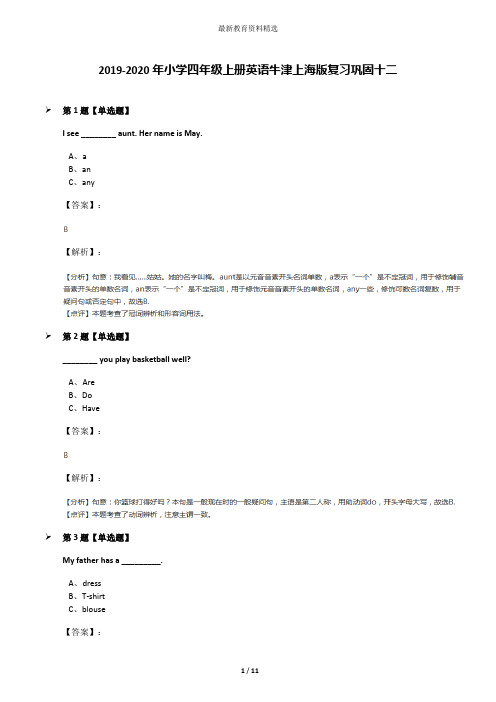
【解析】:
______?
—My name is Jill.
【答案】:【解析】:读一读,判断下列各组单词划线部分的发音是(T)否(F)相同。
1)______dish ship
2)______desk mask
3)______father mother
4)______me she
【答案】:
【解析】:
—Yes, I ______.
—I\"m thirsty. Do you ______ any water!
—Yes. Here you ______.
—What ______ your aunt ______!
—A student.
【答案】:
【解析】:
正确抄写下列单词、词组和句子,抄写句子时注意大小写和标点符号
【答案】:
【解析】:
Look at ______ (Jill) father. ______ (she) father is tall.
【答案】:
【解析】:
______?
—No. I don"t have a balloon.
【答案】:
【解析】:
______?
—He"s a police officer.
—What ______ Mr Li do? ______ he a firefighter?
—No, he ______. He\"s a police officer.
I ______ a blue dress. Kitty ______ a pink dress.
—______ you a nurse?
【答案】:
【解析】:
牛津上海版(试用本)一年级上册英语Module 2 Unit 1 My abilities教案

《牛津英语》(上海版)1A Unit 1 My Abilities教学设计【教学内容】牛津英语1A第一单元My Abilities(我能做的事)【授课对象】一年级学生【教学设计】【设计理念】本课的话题是“我能做的事情”,授课对象是刚刚上小学三个月的一年级同学,结合学生的年龄特点,教师以深受小朋友喜欢的卡通Miffy小兔子一天的生活为本课的整体情景,学生在倾听与感受故事的过程中学习本课知识。
教师结合教学目标设计了丰富的课堂游戏活动,如帮助小兔子回家、摘单词、帮助小兔子闯关吃萝卜、读课文赢取萝卜“喂”兔子等……这些活动设计紧紧围绕本课知识与教学目标,旨在有趣的游戏活动中帮助一年级同学习得与巩固知识,培养参与意识与合作意识,面向全体给每个孩子运用所学语言参与游戏主动表达的机会。
【教学目标】知识与技能目标:(1)通过本课学习学生能够听懂会说,认读词汇:read ,sing, jump, draw;(2)学生会用I can …句型表达自己能做某事;过程与方法目标:(1)通过小组合作学习方式向学生提供应用英语与同伴交流、相互学习的机会,逐步培养合作意识与综合语言运用能力。
(2)学生通过参与课堂活动如:帮助小兔子回家、选择打开不同的礼物盒子、闯关等游戏,在学用结合的情境中锻炼观察能力、动手能力与探索意识。
(3)在学生运用自己所学知识帮助饥饿的小兔子赢取胡萝卜的环节,可帮助学生获得成功体验与感受,培养学生乐于与同伴、教师交流、合作学习和自主达成学习目标的意识。
情感、态度与价值观目标:(1)通关过本课学习,提升学生学习英语的兴趣与热情。
(2)通过有趣的情景与多种适合一年级学生能力和兴趣的教学活动,让学生体验到学习的快乐和成功的喜悦。
【教学重点】帮助学生认读单词 jump , sing, draw, read。
【教学难点】会用I can…表达自己能做的事。
【教学流程】歌曲热身师生合唱课前歌曲Can you swim?进行英语课前热身,通过欢快的英语歌曲将学生自然带入英语学习环境。
2019-2020学年上海市闵行区牛津上海版(试用本)三年级下册期末测试英语试卷
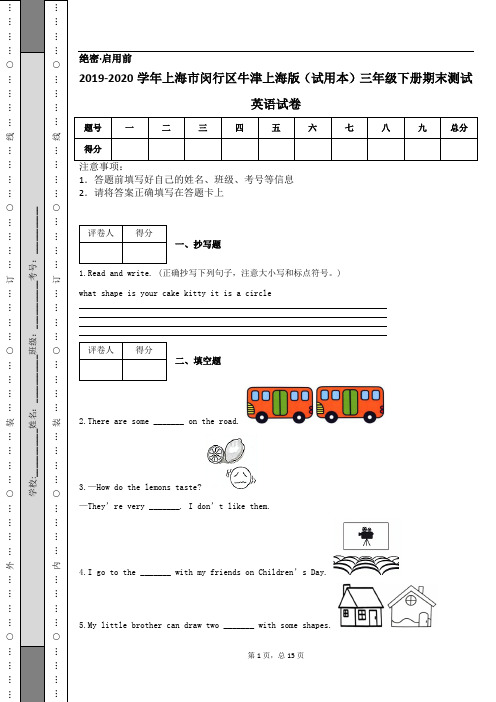
…………外…………○…………装…………………订…学校:___________姓名:______级:___________考号:…………内…………○…………装…………………订…绝密·启用前2019-2020学年上海市闵行区牛津上海版(试用本)三年级下册期末测试英语试卷1.答题前填写好自己的姓名、班级、考号等信息 2.请将答案正确填写在答题卡上一、抄写题1.Read and write. (正确抄写下列句子,注意大小写和标点符号。
) what shape is your cake kitty it is a circle二、填空题2.There are some _______ on the road.3.—How do the lemons taste?—They’re very _______. I don’t like them.4.I go to the _______ with my friends on Children’s Day.5.My little brother can draw two _______ with some shapes.第2页,总15页…………○…………○6.We can _______ trees together in our school garden.7.It’s a _______ (cloud) day. I can see many clouds in the sky.8.—Are you afraid of _______ (lion)?—Yes. So I don’t like them.9.Tom can _______ (skate) very well. Let’s clap _______ (hand) for him.10.My classmates and I like _______ (dance) at the class party.11.The grass _______ (be) new and green. Don’t _______ (walk) on them.三、选择题12.A: What are ____________? ( )B: ____________ are my socks.A.those; theyB.these; TheyC.those; These13.It’s very cold outside. But I have a hat and a pair of ____________. ( ) A.T-shirtB.glovesC.shoe14.A: Is this your book? ( )B: No, it’s ____________ book.A.myB.weC.his15.Children’s Day ____________ Thailand is ____________ January. ( ) A.in; inB.in; onC.on; in…………外…………○…学校:_…………内…………○…16.My hair ____________ short, but my legs ____________ long. ( ) A .are; is B .is; are C .is; is17.Mary and I ____________ girls. We ____________ many nice dresses. ( ) A .are; have B .have; have C .are; are 四、句型转转18.The toy rabbit is soft. (对划线部分提问) _______ _______ the toy rabbit feel? 19.It is a triangle cake. (对划线部分提问) _______ _______ it?20.They are old umbrellas. (改为单数句) _______ _______ old umbrella.21.I go to the beach with my family in July. (对划线部分提问) _______ do you _______ with your family in July? 22.The giraffes like eating leaves. (改为一般疑问句) _______ the giraffes _______ eating leaves? 五、其它第4页,总15页23.It is a _______ day. ( ) A .cool and rainy B .windy and sunny C .cold and windy24.The children have a class party _______. ( ) A .on the beach B .in the zoo C .in the park25.There is a _______ by Danny. ( ) A .small river B .big tree C .lovely dog26.We can see _______ sit under the tall tree. ( ) A .Mary B .David C .Danny27.Three children _______ happily. ( ) A .ride bicycles B .draw pictures C .fly kites 六、排序题28.Read and number. (读一读,根据绘画顺序,用“1—5”给句子编号。
一年级上册英语试题-M2 Unit 2 My family课时练习 牛津上海版(含答案)
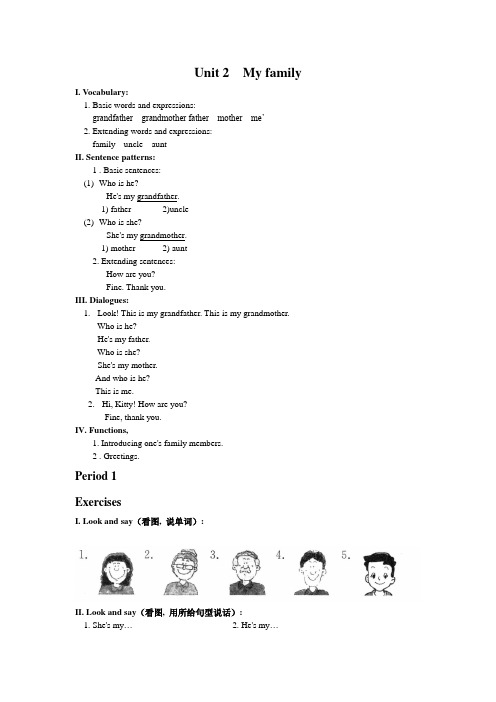
Unit 2 My familyI. Vocabulary:1. Basic words and expressions:grandfather grandmother father mother me’2. Extending words and expressions:family uncle auntII. Sentence patterns:1 . Basic sentences:(1) -Who is he?- He's my grandfather.1) father 2)uncle(2) -Who is she?- She's my grandmother.1) mother 2) aunt2. Extending sentences:- How are you?- Fine. Thank you.III. Dialogues:1. - Look! This is my grandfather. This is my grandmother.- Who is he?- He's my father.- Who is she?- She's my mother.-And who is he?-This is me.2. - Hi, Kitty! How are you?-Fine, thank you.IV. Functions,1. Introducing one's family members.2 . Greetings.Period 1ExercisesI. Look and say(看图, 说单词):II. Look and say(看图, 用所给句型说话):1. She's my…2. He's my…III. Look and read(正确朗读单词):1 . grandmother 2. grandfather 3. mother 4. father 5. me IV. Quick responses(快速反应):1. Goodbye.2. What can you do?3. What can you draw?4. Here you are.5. Touch your face.V. Listen and circle(听录音, 圈出正确的图片):VI. Listen and number(听录音, 给单词正确编号):mother grandfather aunt father grandmother ( ) ( ) ( ) ( ) ( )VII. Listen and match(听录音, 将人物与图片正确连线):l. father2. mother3. grandfather4. grandmotherVIII. Listen and choose(听录音, 选择听到的句子):( ) 1. A. This is my father. B. This is my grandmother( ) 2. A. I can see my mother. B. I can see my grandmother( ) 3. A. She's Kitty. B. He's Danny.( ) 4. A. Look! This is me. B. Look! That's me.( ) 5. A. Touch your head. B. Touch your hair.IX. Read and choose(看图, 选择正确的单词):A. fatherB. grandfatherA. motherB. grandmotherX. Read and choose(选择正确的应答句):( ) 1. Good morning.A. Good afternoon.B. Good morning.( ) 2. Nice to see you.A. Nice to see you, too.B. Goodbye.( ) 3. Who's he?A. She's my grandmother.B. He's my grandfather.( ) 4. Give me your book, please.A. Here you are.B. Thank you.XI. Read and circle(看一看, 圈出与例词相同的词):1. father g r f a t h e r m o2. mother f m o t h e r s q nPeriod 2ExercisesI. Look and read(正确朗读单词):1. father2. grandmother3. mother4. grandfather5. me II. Look and say(看图, 用所给句型说话):1. She is my . .2. He is my .3. I can see my .4. This is my .III. Look and read正确朗读句子):1. This is my family.2. He is my father.3. She is my mother.4. I can draw a flower.5. Touch your nose.IV. Introduce yourself(用所给的句型介绍自己):This is me. I can… I can …I can …I can draw…V. Listen and circle(听录音, 圈出正确的图片):VI. Listen and number(听录音, 将句子正确编号):( ) I can draw a house.( ) Father can read a book.( ) Mother can sing a song.( ) Grandfather can draw a flower.VII. Listen and judge(听录音, 判断听到的内容是否与图片一致, 用“√”或“×”表示):VIII. Listen and circle(听录音, 圈出听到的单词):1. A. draw B. dance2. A. mother B. father3. A. grandfather B. grandmother4. A. hair B. head5. A. aunt B. uncle6. A. my B. yourIX. Look and choose(看图, 选择正确的单词):( ) 1. Give me ___________. A. book B. bag( ) 2. This is my ___________. A. uncle B. mother( ) 3. That's m_____________. A. father B. motherX. Read and choose(选择不同类的词):( ) 1. A. rubber B. ruler C. book D. draw ( ) 2. A. mother B. me C. aunt D. grandfather ( ) 3. A. sing B. eye C. dance D. read ( ) 4. A. hello B. hair C. head D. faceXI. Read and circle(看一看, 圈出与例词相同的词):1. grandfather p g r a n d f a t h e r2. grandmother g r a n d m o t h e r z Period 3ExercisesI. Look and say(看图, 说单词):II. Look and say(看图, 用所给句型说话):III. Answer the questions(正确回答问题):1. What can your father do?2. What can your mother do?3. Who is she? (grandmother)4. Who is he? (grandfather)5. What's this? (ruler)IV. Recite a rhyme(背诵一首英语儿歌):V. Listen and circle(听录音, 圈出正确的图片):VI. Listen and circle(听录音, 圈出听到的单词):1. A. mother B. father2. A. head B. hair3. A. dance B. draw4. A. me B. see5. A. my B. hi6. A. uncle B. aunt VII. Listen and match(听录音, 将人物与图片正确连线):VIII. Listen and choose(听录音, 选择正确的应答句):( ) 1. A. She is my aunt. B. He is my uncle.( ) 2. A. She is my grandmother. B. He is my grandfather: ( ) 3. A. You're welcome. B. How nice!( ) 4. A. I can see a book. B. Here you are.( ) 5. A. Yes, it's me! B. I can read.IX. Read and choose(看图, 选择正确的单词):A. mouthB. noseA. grandfatherB. grandmotherA. motherB. fatherA. singB. danceX. Read and choose(选择不同类的词):( ) l. A. morning B. evening C. he D. afternoon ( ) 2. A. hair B. face C. father D. mouth ( ) 3. A. book B. aunt C. mother D. grandfather ( ) 4. A. pencil B. dance C. read D. singXI. Read and choose(选择正确的应答句):( ) l. Who is he?A. He is my father.B. She is my mother.( ) 2. Who is she?A. She is my aunt.B. He is my uncle.( ) 3. What can you do?A. This is my nose.B. I can draw a pencil.( ) 4. How are you?A. Fine. Thank you.B. I am Alice,Revision for Module 2 Unit 2 SpeakingI. Look and say(看图, 说单词): 10%II. Look and read(正确朗读所给的词组): 10%1 . my grandfather 2. your father 3. read a book4. draw a flower5. good afternoonIII. Answer the questions(正确回答问题):10%l. How are you?2. What can you do? (sing)3. Who's he? (uncle)4. Who's she? (aunt)5 . What can you draw? (rubber)IV. Look and say(看图, 用所给句子说话):10%1. - What can you do?- I can…2. Give me a …3. Touch your…4. This is my …5. He is your …V. Introduce your mother(用所给句子介绍妈妈, 至少5句话): 5% I'm…This is my mother. She can…VI. Recite a rhyme(背诵一首英语儿歌“Who is he?”): 5% ListeningI. Listen and circle(听录音, 圈出正确的图片): 10%II. Listen and match(听录音, 将人物与图片正确连线):10%III. Listen and judge(听录音, 判断听到的句子与图片是否相符,用“√”或“×”表示): 10%IV Listen and choose(听录音, 选择听到的句子): 10%( ) 1. A. Who is he? B. Who is she?( ) 2. A. She's my mother. B. He's my father.( ) 3. A. My aunt can dance. B. My uncle can draw.( ) 4. A. This is me. B. That's you.( ) 5. A. How are you? B. How nice!WritingI. Read and choose(选出不同类的词):4%( ) 1. A. father B. mother C. face D. grandfather( ) 2. A. ear B. book C. eye D. mouth( ) 3. A. Jack B. Peter C. Eddie D. head( ) 4. A. hair B. sing C. read D. drawII. Read and choose(选择正确的应答句): 4%( ) 1. What can you do?A. I can draw a book.B. I am fine.( ) 2. Who is he?A. He can dance.B. He is my father.( ) 3. Who is she?A. This is my mother.B. She is my mother.( ) 4. How are you?A. I am fine.B. I see a book.III. Read and circle(看一看, 圈出与例词相同的词): 2%1. uncle p n a u n c 1 e h w2. mother m o t h e r g z p qUnit 2 My familyPeriod 1ExercisesV. Listen and circle(听录音, 圈出正确的图片):1. sing (B)2. mother (A)3. grandfather (A)4. eye (B)5. draw (B)6. pencil (A) VI. Listen and number(听录音, 给单词正确编号):grandfather, father, mother, grandmother, aunt (3, 1, 5, 2, 4)VII. Listen and match(听录音, 将人物与图片正确连线):l. Father can sing a song. (B) 2. Mother can dance. (A) 3. Grandfather can read book. (D)4. Grandmother can draw. (C)VIII. Listen and choose(听录音, 选择听到的句子):l. This is my grandmother. (B) 2. I can see my mother. (A) 3. He's Danny. (B)4. Look! That's me. (B)5. Touch your head. (A)IX. l. B 2. AX. 1. B 2. A 3. B 4. AXI. 略Period 2ExercisesV. Listen and circle(听录音, 圈出正确的图片):l. aunt (B) 2. uncle (A) 3. grandfather (B) 4. flower (A) 5. sing (B) 6. draw (A)VI. Listen and number(听录音, 将句子正确编号):Mother can sing a song. Grandmother can dance. I can draw a house. Father can read a book. Grandfather can draw a flower. (3,4, 1,5, 2)VII. Listen and judge(听录音, 判断听到的句子与图片是否相符, 用“√”或“×”表示):1. This is my aunt.(√)2. She is my mother.(×)3. He is my father.(√)4. He is my uncle. (,√)5. She is my grandmother. (×)VIII. Listen and circle(听录音, 圈出听到的单词):1. draw (A)2. father (B)3. grandmother (B)4. hair (A)5. uncle (B)6. my (A)IX. 1.B 2.A 3.BX. 1. D 2. B 3. B 4. A。
牛津上海版中考英语专题复习-20 阅读D篇回答问题
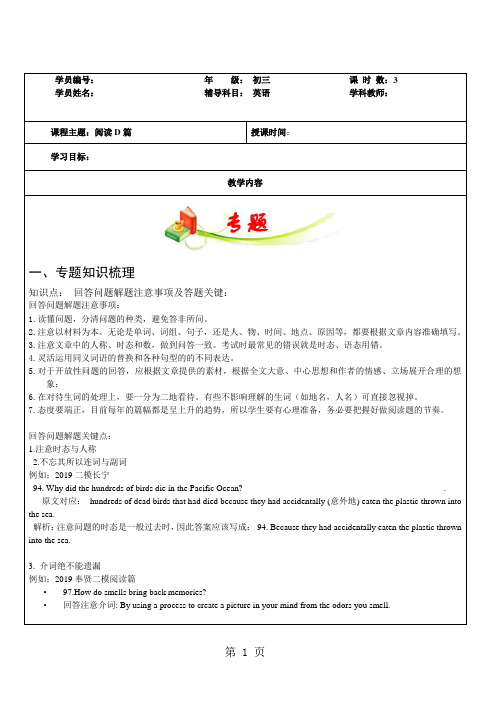
学员编号:年级:初三课时数:3学员姓名:辅导科目:英语学科教师:课程主题:阅读D篇授课时间:学习目标:教学内容一、专题知识梳理知识点:回答问题解题注意事项及答题关键:回答问题解题注意事项:1.读懂问题,分清问题的种类,避免答非所问。
2.注意以材料为本。
无论是单词、词组、句子,还是人、物、时间、地点、原因等,都要根据文章内容准确填写。
3.注意文章中的人称、时态和数,做到问答一致。
考试时最常见的错误就是时态、语态用错。
4.灵活运用同义词语的替换和各种句型的的不同表达。
5.对于开放性问题的回答,应根据文章提供的素材,根据全文大意、中心思想和作者的情感、立场展开合理的想象;6.在对待生词的处理上,要一分为二地看待。
有些不影响理解的生词(如地名,人名)可直接忽视掉。
7.态度要端正,目前每年的篇幅都是呈上升的趋势,所以学生要有心理准备,务必要把握好做阅读题的节奏。
回答问题解题关键点:1.注意时态与人称2.不忘其所以连词与副词例如:2019二模长宁94. Why did the hundreds of birds die in the Pacific Ocean? __________________________________________.原文对应:hundreds of dead birds that had died because they had accidentally (意外地) eaten the plastic thrown into the sea.解析:注意问题的时态是一般过去时,因此答案应该写成:94. Because they had accidentally eaten the plastic thrown into the sea.3. 介词绝不能遗漏例如:2019奉贤二模阅读篇•97.How do smells bring back memories?•回答注意介词: By using a process to create a picture in your mind from the odors you smell.二、专题精讲例题1:Every month, junior high schools in China choose one hero of the month. This person is a hero because he or she has done something to help protect animals in danger. Huang Jing decided to write a letter to the President of China.Dear Mr. President,I have been doing a project at school recently about animals in danger. I think the situationall over the world is really awful. I am writing to you to suggest what China should do to helpprotect animals more.I know that there are nearly 2,000 nature reserves (保护区) in China, which is good. I livein Beijing and there are about 30 reserves outside the city. We visited one of them last monthto see for ourselves.I feel so sorry for the giant panda. It’s one of the most popularanimals in the world and a real symbol of China. We learned that pandasmainly live on bamboo, and that a panda can eat half its body weight ofbamboo in 24 hours! That’s a lot of bamboo. I think we should try to domore to stop cutting down their forests. Pandas are already a rare animal and it would be so sad if they became extinct (灭绝) forever.The other animal we should try to protect more is the Chinese alligator(扬子鳄). These creatures live in some parts of eastern China. Thesebeautiful animals live in freshwater rivers and lakes but the water in someplaces isn’t clean enough for them to live in. It’s really dirty in fact. Thegovernment should stop factories polluting the lakes and rivers.If we protect these beautiful animals in China, more people may wish to visit China to see them. They could be an important tourist attraction. It would be good if more people came tovisit our beautiful country, especially to see the quieter areas in the country. Now most visitorsjust see the cities.I hope you will encourage more people to think about such an important subject.Sincerely yours,Huang Jing93. What’s Huang Jing’s project at school about?I t’s about __________________________.94. What animals did Huang Jing talk about in his letter?__________________________.95. How much bamboo can a panda eat in 24 hours?__________________________.96. Why is the water in some places too dirty for alligators to live in?__________________________.89.To get into a company / The previous one / The first one90.Three91.In order to comfort her92.I have succeed/ I am employed93.Be polite and never give up.作业2:2019年二模闸北区D. Answer the questions(根据短文内容回答下列问题): (12分)Super SingersImagine yourself singing in front of an audience, performing in other countries, and having your music put on a CD! All this excitement isn’t just for rock stars. Joining a children’s chorus gives kids the chance to do these exciting activities. What does it take to get into a children’s chorus? You don’t need years of singing lessons. You just need to have a love for singing and be willing to learn and follow directions.It all starts at the audition(试唱). The choirmaster, or conductor, will have you sing with a group of kids. As the group sings, the conductor listens to how your voice comes together. You’ll also probably be asked to sing by yourself. The conductor wants to figure out what type of voice you have. A girl with a high voice is a soprano while a girl with a low voice is an alto. A boy with a high voice is a tenor, while a boy with a low voice is a bass. When the whole chorus sings together, the different types of voices sing different notes to the same song. This is called “singing parts”.Once you pass the audition, you might be assigned to a specific group. Beginning singers are often grouped together in a “Treble Chorus”. More advanced singers might be in a “Concert Chorus”. Different choirs have different names for these groups. No matter which group you’re in, you’ll need to go to rehearsals. Most children’s choirs rehearse once a week.93. What do you need to join a children’s chorus?_____________________________________________________.94. What are you required to do at the audition?_____________________________________________________.95. What will Jane probably be if she has a low voice?_____________________________________________________.96. Beginning singers are often grouped together in a “Concert Chorus”, aren’t they?__________________________________________________.97. How often do most children’s choirs rehearse?_____________________________________________________.98. What good is being a member of a choir?_____________________________________________________.答案:93. You need to love singing and be able to follow directions.94. You sing with a group of kids and by yourself.95. An alto.96. No, they aren’t.97. Once a week.98. Any reasonable answer is acceptable.。
2023-2024学年上海普陀牛津上海版(试用本)一年级上英语期末试卷(真题及答案)

2023-2024学年上海普陀牛津上海版(试用本)一年级上英语期末试卷学校:__________ 班级:__________ 姓名:__________ 考号:__________注意事项:1.答题前填写好自己的姓名、班级、考号等信息;2.请将答案正确填写在答题卡上;一、单选题(本大题共计21小题,每题3分,共计63分)1. ( )A. rulerB. crayon【答案】A【解析】A尺子;B彩笔;图片是尺子,故选A.2.—Is this your garden? ( )—________A. No, we aren’t.B. Yes, it is.C. No, we are.【答案】B【解析】句意:—这是你的花园吗?—________。
A不,我们不是;B是的,它是;C不,我们是,表达错误,排除C;根据题意,可知句子为is引导的一般疑问句,肯定答语Yes, it is. 否定答语No, it isn't. 故选B.3.dress ( )A.B.【答案】A【解析】A. 连衣裙,B. 短裙,dress汉语为连衣裙,故选A.4. ( )A. busB. party【解析】A公共汽车,B聚会,A符合图片。
故选A.5. ( )A. schoolB. doctor【答案】A【解析】A学校,B医生。
A符合图片。
故选A.6.farmer ( )A.B.【答案】A【解析】A选项农民,B选项老师,根据题意,可知farmer为农民,A选项符合,故选A.7.—Who's that boy? ( )—He's my ________.A. brotherB. studentC. teacher【答案】A【解析】句意:—那个男孩是谁?—他是我的弟弟。
A弟弟,B学生,C老师。
A符合题意,故选A.8.window ( )A.B.【解析】A. 墙,B. 窗户,window是窗户,故选B.9. ( )A. hairB. mouth【答案】B【解析】A头发,B嘴巴,B符合图片,故选B.10.three keys ( )A.B.【答案】B【解析】A. 三块糖,B. 三把钥匙,three keys三把钥匙,故选B.11.kite ( )A.B.【答案】B【解析】kite风筝,图片A是猪,图片B是风筝,故选B.12.—Where is my ball? ( )—It' s ________ the desk, so you can't see it.A. aboveB. in front ofC. behind【答案】C【解析】句意:—我的球在哪?—它在桌子后面,所以你看不到它。
牛津上海版一年级上册小学英语同步练习试题含答案(全册)
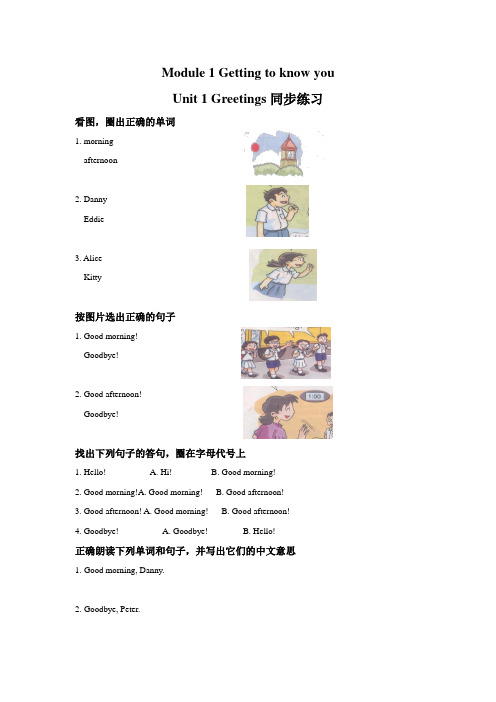
Module 1 Getting to know youUnit 1 Greetings同步练习看图,圈出正确的单词1. morningafternoon2. DannyEddie3. AliceKitty按图片选出正确的句子1. Good morning!Goodbye!2. Good afternoon!Goodbye!找出下列句子的答句,圈在字母代号上1. Hello! A. Hi! B. Good morning!2. Good morning!A. Good morning! B. Good afternoon!3. Good afternoon! A. Good morning! B. Good afternoon!4. Goodbye! A. Goodbye! B. Hello!正确朗读下列单词和句子,并写出它们的中文意思1.Good morning, Danny.________________________________2.Goodbye, Peter._______________________________3.Hello, Kitty.______________________________4.Hi! I’m Alice.______________________________5.Good afternoon!_____________________________在字母盒中找出下列单词1. morning a m b m o r n i n g h e2. hello h e l l o o b e a l l o g3. afternoon a b a f t e r n o o n o n参考答案看图,圈出正确的单词1. afternoon2. Danny3. Kitty按图片选出正确的句子1. Good morning!2. Good afternoon!找出下列句子的答句,圈在字母代号上1. Hi!2. Good morning!3. Good afternoon!4. Goodbye!正确朗读下列单词和句子,并写出它们的中文意思1.早上好,丹尼。
牛津上海版一年级上册小学英语教案全册

牛津上海版一年级上册小学英语教案全册一、教学内容Chapter 1:Hello!(问候)Chapter 2:My family(我的家庭)Chapter 3:My pets(我的宠物)Chapter 4:At school(在学校)Chapter 5:My body(我的身体)Chapter 6:Fruits(水果)二、教学目标1. 让学生掌握基本的英语问候语,学会介绍自己的家庭成员、宠物、身体部位等。
2. 培养学生的英语听说能力,使他们能够进行简单的日常交流。
3. 培养学生热爱生活、关爱家人和动物的价值观。
三、教学难点与重点1. 教学难点:单词和句型的发音,以及日常对话的应用。
2. 教学重点:问候语、介绍家人和宠物、描述身体部位等日常用语。
四、教具与学具准备1. 教具:卡片、挂图、录音机、磁带、多媒体设备等。
2. 学具:课本、练习册、彩色笔、剪刀、胶水等。
五、教学过程1. 实践情景引入:通过播放教材配套录音,让学生模仿并参与角色扮演,进行问候、介绍家人等情景交流。
2. 例题讲解:针对每个章节的重点句型和单词进行讲解,引导学生跟读、模仿。
Chapter 1:Hello!(问候)句型:Hello! Hi! How are you? I'm fine, thank you!单词:hello, hi, how, are, you, fine, thank, you Chapter 2:My family(我的家庭)句型:This is my mother/father/brother/sister. I love my family.单词:mother, father, brother, sister, family, love Chapter 3:My pets(我的宠物)句型:I have a dog/cat/bird. My pet is cute.单词:dog, cat, bird, pet, cuteChapter 4:At school(在学校)句型:I go to school. I like my teacher and classmates.单词:school, teacher, classmates, likeChapter 5:My body(我的身体)句型:This is my head/eye/nose/mouth. I cansee/hear/smell/taste.单词:head, eye, nose, mouth, see, hear, smell, tasteChapter 6:Fruits(水果)句型:I like apples/oranges/bananas. Fruits are healthy.单词:apple, orange, banana, fruit, healthy3. 随堂练习:针对每个章节的内容,设计相应的练习题,让学生进行口语练习和书写练习。
牛津上海版一年级上册小学英语优质教案全册

牛津上海版一年级上册小学英语优质教案全册一、教学内容本节课,我们将学习牛津上海版一年级上册小学英语教材第三单元“Meeting new friends”第一课时。
具体内容包括:引言部分,通过图片和情景对话,让学生掌握基本问候语和介绍自己方式;课文部分,通过故事主人公小熊Bob交朋友过程,教授学生如何用简单英语进行自我介绍和询问他人信息;练习部分,通过各种实践活动,巩固问候语和介绍自己表达方式。
二、教学目标1. 让学生掌握基本问候语,如“Hello”、“Hi”、“Good morning”等,并能够灵活运用。
2. 培养学生用简单英语进行自我介绍和询问他人信息能力。
3. 增强学生英语口语表达能力,提高他们与人交往信心。
三、教学难点与重点1. 教学难点:问候语和自我介绍表达方式,以及如何用英语询问他人信息。
2. 教学重点:让学生在实际情景中灵活运用所学知识,提高口语表达能力。
四、教具与学具准备1. 教具:图片、卡片、录音机、磁带、多媒体设备。
2. 学具:课本、练习本、彩色笔。
五、教学过程1. 导入:通过图片展示不同问候场景,引导学生用英语问候彼此,激发学习兴趣。
2. 新课内容展示:播放课文录音,让学生跟读,学习问候语和自我介绍表达方式。
3. 实践活动:分组进行角色扮演,模拟小熊Bob交朋友场景,巩固所学知识。
4. 例题讲解:针对学生在实践活动中遇到问题,进行讲解和示范。
5. 随堂练习:让学生用所学知识,编写一段自我介绍对话,并进行展示。
六、板书设计1. Meeting new friends2. 内容:Greetings: Hello, Hi, Good morning, Good afternoon, Good evening, Goode七、作业设计1. 作业题目:编写一段与同学问候和自我介绍对话。
2. 答案示例:八、课后反思及拓展延伸1. 课后反思:本节课通过情景教学法和实践活动,让学生掌握基本问候语和自我介绍表达方式,提高口语表达能力。
上海版小学英语牛津词汇表(带音标)
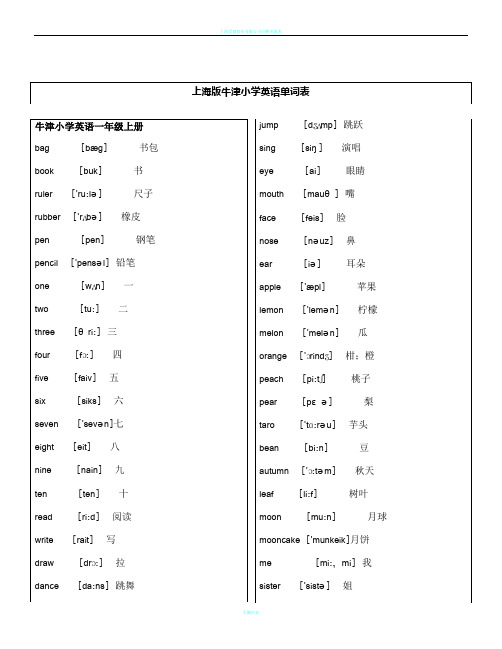
jump [dʒʌmp] 跳跃sing [siŋ] 演唱eye [ai] 眼睛mouth [mauθ] 嘴face [feis] 脸nose [nəuz] 鼻ear [iə] 耳朵apple ['æpl] 苹果lemon ['lemən] 柠檬melon ['melən] 瓜orange ['ɔrindʒ] 柑;橙peach [pi:tʃ] 桃子pear [pεə] 梨taro ['tɑ:rəu] 芋头bean [bi:n] 豆autumn ['ɔ:təm] 秋天leaf [li:f] 树叶moon [mu:n] 月球mooncake ['munkeik]月饼me [mi:, mi] 我sister ['sistə] 姐father ['fɑ:ðə] 父亲mother ['mʌðə] 母亲slide [slaid] 滑动swing [swiŋ] 摇摆bicycle ['baisikl] 脚踏车;自行车ball [bɔ:l] 球balloon [bə'lu:n] 气球doll [dɔl] 洋娃娃牛津小学英语一年级下册Grandmother ['ɡrænd,mʌðə] 祖母Grandfather ['ɡrænd,fɑ:ðə] 祖父Granddaughter['ɡræn,dɔ:tə] (外)孙女grandson ['ɡrændsʌn] 孙子,外孙Uncle ['ʌŋkl] 伯父;叔叔aunt [a:nt] 姑妈;伯母butterfly ['bʌtəflai] 蝴蝶bird [bə:d] 鸟bee [bi:] 蜜蜂frog [frɔɡ] 青蛙rabbit ['ræbit] 兔colour ['kʌlə] 颜色black [blæk] 黑色(的)white [wait] 白色(的)brown [braun] 褐色(的)pink [piŋk] 粉红色(的)red [red] 红色(的)orange ['ɔrindʒ]橙色(的)yellow ['jeləu] 黄色(的)green [gri:n] 绿色(的)blue [blu:] 蓝色(的)purple ['pə:pl] 紫色(的)tall [tɔ:l] 高的short [ʃɔ:t] 矮的;短的fat [fæt] 胖的thin [θin] 瘦的old [əuld] 年老的young [jʌŋ] 年轻的postman ['pəustmən] 邮差policeman [pə'li:smən] 警察fireman ['faiəmən] 消防队员milkman ['milkmən] 送奶工人;售奶工人fisherman ['fiʃəmən] 渔民;渔夫farmer ['fɑ:mə] 农夫;农民teacher ['ti:tʃə] 教师driver [draivə] 司机doctor [dɔktə] 医生nurse [nə:s] 护士cook [kuk] 厨师meat [mi:t] 肉rice [rais] 米饭noodles ['nu:dls] 面条soup [su:p] 汤cake [keik] 蛋糕ice-cream 冰淇淋sweet [swi:t] 糖果jelly ['dʒeli] 果冻coke [kuk] 可乐牛津小学英语二年级上册bin [bin] 筒park [pa:k] 公园road [rəud] 道路building ['bildiŋ] 建筑物pizza ['pi:tsə] 比萨饼biscuit ['biskit] 饼干hotdog [hɔtdɔg] 热狗juice [dʒu:s] (果)汁、液water ['wɔ:tə] 水play [plei] 玩,玩耍run [rʌn] 跑sleep [sli:p] 睡觉swim [swim] 游泳plane [plein] 飞机ferry ['feri] 摆渡;渡船train [trein] 火车taxi ['tæksi] 出租车car [ka:] 汽车;小汽车bus [bʌs] 公共汽车van [væn] 有蓬货车stop [stɔp] 停止go [ɡəu] 去;走light [lait] 灯;光fast [fa:st] 快速的slow [sləu] 缓慢的in [in] 在……之内(里) on [ɔn] 在……之上under ['ʌndə] 在……之下bell [bel] 铃;钟star [sta:] 星;恒星present ['preznt]赠品;礼物tree [tri:] 树hat [hæt] 帽子glove [ɡlʌv] 手套scarf [ska:f] 围巾winter ['wintə] 冬季cold [kəuld] 寒冷wind [wind] 风snow [snəu] 雪tie [tai] 领带;带子belt [belt] 腰带sock [sɔk] 袜子shirt [ʃə:t] 衬衫dress [dres] 女服;童装coat [kəut] 外套牛津小学英语二年级下册hen [hen] 母鸡chick [tʃik] 小鸡duck [dʌk] 鸭子cow [kau] 母牛sheep [ʃi:p] 羊pig [pig] 猪horse [hɔ:s] 马bear [bεə] 熊elephant ['elifənt] 大象tiger ['taiɡə] 老虎monkey ['mʌŋki] 猴子panda ['pændə] 熊猫window ['windəu] 窗户door [dɔ:] 门bed [bed] 窗room [ru:m] 房间sofa ['səufə] 沙发table ['teibl] 桌子lamp [læmp] 灯walk [wɔ:k] 步行;散步skip [skip] 跳跃swing [swiŋ] 秋千;摇摆climb [klaim] 攀登;爬fly [flai] 飞翔ride [raid] 骑;乘glass [gla:s] 玻璃;玻璃杯water ['wɔ:tə] 水soap [səup] 肥皂wash [wɔʃ] 洗dirty ['də:ti] 脏的towel ['tauəl] 手巾;毛巾toothbrush ['tu:θbrʌʃ] 牙刷Toothpaste ['tu:θpeist] 牙膏chopsticks ['tʃɔpstiks] 筷子bowl [bəul] 碗plate [pleit] 盘子spoon [spu:n] 勺子;匙fork [fɔ:k] 叉knife [naif] 刀summer ['sʌmə] 夏季sun [sʌn] 太阳cloud [klaud] 云hot [hɔt] 热的beach [bi:tʃ] 海滩shell [ʃel] 贝壳sand [sænd] 沙子watch [wɔtʃ] 手表clock [klɔk] 钟表day [dei] 白天night [nait] 夜晚breakfast ['brekfəst] 早餐牛津小学英语三年级上册late [leit] adj. 迟的very ['veri] adv.很again [ə'ɡen] adv.再no [nəu] interj.不yes [jes] interj.是please [pli:z] interj.请ruler ['ru:lə] n.尺window ['windəu] n.窗kite [kait] n.风筝dog [dɔɡ] n.狗jam [dʒæm] n.果酱box [bɔks] n.盒子ear [iə] n.耳朵mouse [maus] n.老鼠cat [kæt] n.猫door [dɔ:] n.门name [neim] n.名字girl [ɡə:l] n.女孩apple ['æpl] n.苹果pencil ['pensəl]n.铅笔lion ['laiən] n.狮子hand [hænd] n.手book [buk] n.书bag [bæɡ] n.书包desk [desk] n.书桌elephant ['elifənt] n.象rubber ['rʌbə] n.橡皮擦school [sku:l] n.学校clock [klɔk] n.钟you [ju:] pron.你,你们your [jɔ:] pron.你的,你们的what [hwɔt] pron.什么see [si:] v.看见clean [kli:n] v.把……弄干净close [kləuz] v.关open ['əupən] v.开look(at) v.看(着) are [a:] v.是Mrs ['misiz] 夫人Mr [mist] 先生Miss [mis] 小姐big [big] adj.大的long [lɔŋ] adj.长的short [ʃɔ:t] adj.短的tall [tɔ:l] adj.高的good [gud] adj.好的yellow ['jeləu] adj.黄色的sad [sæd] adj.沮丧的thin [θin] adj.瘦的little ['litl] adj.小的happy ['hæpi] adj.幸福的and [ænd] conj.和dad [dæd] n.爸爸mother ['mʌðə] n.妈妈cake [keik] n.蛋糕father ['fɑ:ðə] n.父亲x-ray ['eksrei]n.X光teacher ['ti:tʃə]n.教师sister ['sistə] n.姐妹brother ['brʌðə]n.兄弟boy [bɔi] n.男孩friend [frend] n.朋友umbrella [ʌm'brelə]n.伞sun [sʌn] n.太阳queen [kwi:n] n.王后tail [teil] n.尾巴rain [rein] n.雨small [smɔ:l] adj.小的with [wið] prep.和……一起in [in] prep.在……里who [hu:] pron.谁she [ʃi:] pron.她he [hi:] pron.他it [it] pron.它they [ðei] pron.他们am [æm] v.是is [iz] v.是me [mi:] pron.我(宾格) my [mai] pron.我的baby ['beibi]n.婴儿bow [bau] v.鞠躬,弯腰play [plei] v.玩like [laik] v.喜欢new [nju:] adj.新的up [ʌp] adv.向上down [daun] adv.向下office ['ɔfis] n.办公室flower ['flauə]n.花slide [slaid] n.滑梯classroom ['klɑ:srum] n.教室playground ['pleiɡraund]n.操场hall [hɔ:l] n.礼堂circle ['sə:kl] n.圈triangle ['traiæŋɡl]n.三角形tree [tri:] n.树sky [skai] n.天空library ['laibrəri]n.图书馆banana [bə'nɑ:nə] n.香蕉boat [bəut] n.小船star [sta:] n.星shape [ʃeip] n.形状chair [tʃεə] n.椅子cloud [klaud] n.云square [skwεə] n.正方形that [ðæt] pron.那this [ðis] pron.这stand [stænd] v.站(起) sit [sit] v.坐(下) sorry ['sɔ:ri] adj.抱歉的duck [dʌk] n.鸭fly [flai] n.苍蝇gate [geit] n.大门root [ru:t] n.根egg [eg] n.鸡蛋chick [tʃik] n.小鸡chicken ['tʃikin] n.鸡肉ladybird ['leidibə:d]n.甲虫sandwich ['sænwidʒ] n.三明治sweet [swi:t] n.糖果head [hed] n.头leg [leg] n.腿shoe [ʃu:] n.鞋camera ['kæmərə]n.照相机plant [pla:nt] n.植物pig [pig] n.猪count [kaunt] v.数find [faind] v.找到has [hæz] v.有Excuse me. 对不起。
牛津上海版一年级上册小学英语教案全册(1)
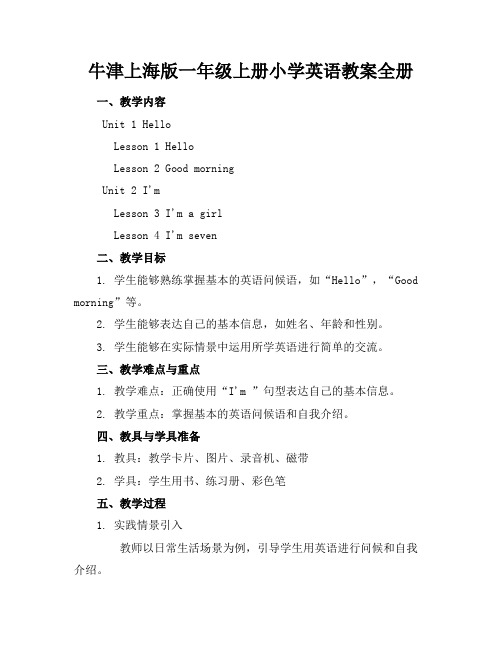
牛津上海版一年级上册小学英语教案全册一、教学内容Unit 1 HelloLesson 1 HelloLesson 2 Good morningUnit 2 I'mLesson 3 I'm a girlLesson 4 I'm seven二、教学目标1. 学生能够熟练掌握基本的英语问候语,如“Hello”,“Good morning”等。
2. 学生能够表达自己的基本信息,如姓名、年龄和性别。
3. 学生能够在实际情景中运用所学英语进行简单的交流。
三、教学难点与重点1. 教学难点:正确使用“I'm ”句型表达自己的基本信息。
2. 教学重点:掌握基本的英语问候语和自我介绍。
四、教具与学具准备1. 教具:教学卡片、图片、录音机、磁带2. 学具:学生用书、练习册、彩色笔五、教学过程1. 实践情景引入教师以日常生活场景为例,引导学生用英语进行问候和自我介绍。
学生进行角色扮演,练习问候和自我介绍。
2. 例题讲解教师讲解教材中的例题,如“Hello, I'm ”,“Good morning, I'm ”等。
学生跟随教师一起朗读,并模仿例题进行练习。
3. 随堂练习学生两人一组,互相问候和自我介绍。
教师随机抽取学生进行展示,并及时给予反馈。
4. 小组活动学生分成小组,进行“猜猜我是谁”的游戏,巩固所学知识。
六、板书设计1. 在黑板上写出本节课的重点词汇和句子。
2. 用不同颜色的粉笔标出教学难点和重点。
七、作业设计1. 作业题目:制作一张自己的名片,包括姓名、年龄、性别等信息,并用英语进行自我介绍。
2. 答案示例:Name: Zhang WeiAge: EightGender: BoySelfintroduction: Hello, I'm Zhang Wei. I'm eight years old. I'm a boy.八、课后反思及拓展延伸1. 教师反思:本节课学生的参与度较高,但部分学生在自我介绍时仍存在发音不准确的问题,需要在今后的教学中加强指导。
牛津上海版小学英语1-5年级英语牛津词汇表(带音标)
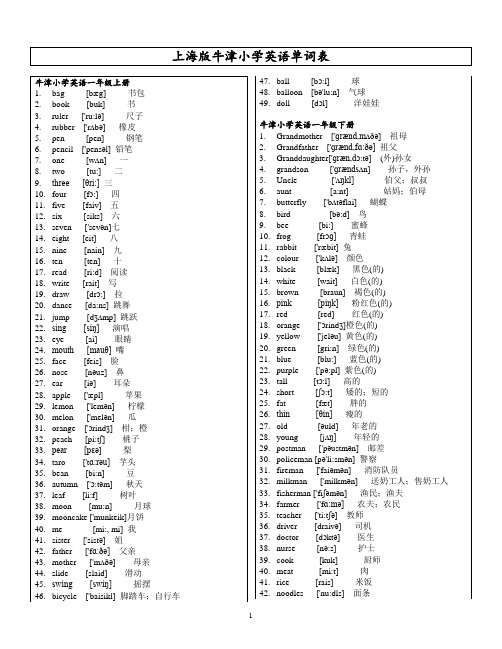
47.ball [bɔ:l] 球48.balloon [bə'lu:n] 气球49.doll [dɔl] 洋娃娃牛津小学英语一年级下册1.Grandmother ['ɡrænd,mʌðə] 祖母2.Grandfather ['ɡrænd,fɑ:ðə] 祖父3.Granddaughter['ɡræn,dɔ:tə] (外)孙女4.grandson ['ɡrændsʌn] 孙子,外孙5.Uncle ['ʌŋkl] 伯父;叔叔6.aunt [a:nt] 姑妈;伯母7.butterfly ['bʌtəflai] 蝴蝶8.bird [bə:d] 鸟9.bee [bi:] 蜜蜂10.frog [frɔɡ] 青蛙11.rabbit ['ræbit] 兔12.colour ['kʌlə] 颜色13.black [blæk] 黑色(的)14.white [wait] 白色(的)15.brown [braun] 褐色(的)16.pink [piŋk] 粉红色(的)17.red [red] 红色(的)18.orange ['ɔrindʒ]橙色(的)19.yellow ['jeləu] 黄色(的)20.green [gri:n] 绿色(的)21.blue [blu:] 蓝色(的)22.purple ['pə:pl] 紫色(的)23.tall [tɔ:l] 高的24.short [ʃɔ:t] 矮的;短的25.fat [fæt] 胖的26.thin [θin] 瘦的27.old [əuld] 年老的28.young [jʌŋ] 年轻的29.postman ['pəustmən] 邮差30.policeman [pə'li:smən] 警察31.fireman ['faiəmən] 消防队员kman ['milkmən] 送奶工人;售奶工人33.fisherman ['fiʃəmən] 渔民;渔夫34.farmer ['fɑ:mə] 农夫;农民35.teacher ['ti:tʃə] 教师36.driver [draivə] 司机37.doctor [dɔktə] 医生38.nurse [nə:s] 护士39.cook [kuk] 厨师40.meat [mi:t] 肉41.rice [rais] 米饭42.noodles ['nu:dls] 面条43.soup [su:p] 汤44.cake [keik] 蛋糕45.ice-cream 冰淇淋46.sweet [swi:t] 糖果47.jelly ['dʒeli] 果冻48.coke [kuk] 可乐牛津小学英语二年级上册1.bin [bin] 筒2.park [pa:k] 公园3.road [rəud] 道路4.building ['bildiŋ] 建筑物5.pizza ['pi:tsə] 比萨饼6.biscuit ['biskit] 饼干7.hotdog [hɔtdɔg] 热狗8.juice [dʒu:s] (果)汁、液9.water ['wɔ:tə] 水10.play [plei] 玩,玩耍11.run [rʌn] 跑12.sleep [sli:p] 睡觉13.swim [swim] 游泳14.plane [plein] 飞机15.ferry ['feri] 摆渡;渡船16.train [trein] 火车17.taxi ['tæksi] 出租车18.car [ka:] 汽车;小汽车19.bus [bʌs] 公共汽车20.van [væn] 有蓬货车21.stop [stɔp] 停止22.go [ɡəu] 去;走23.light [lait] 灯;光24.fast [fa:st] 快速的25.slow [sləu] 缓慢的26.in [in] 在……之内(里)27.on [ɔn] 在……之上28.under ['ʌndə] 在……之下29.bell [bel] 铃;钟30.star [sta:] 星;恒星31.present ['preznt]赠品;礼物32.tree [tri:] 树33.hat [hæt] 帽子34.glove [ɡlʌv] 手套35.scarf [ska:f] 围巾36.winter ['wintə] 冬季37.cold [kəuld] 寒冷38.wind [wind] 风39.snow [snəu] 雪40.tie [tai] 领带;带子41.belt [belt] 腰带42.sock [sɔk] 袜子43.shirt [ʃə:t] 衬衫44.dress [dres] 女服;童装45.coat [kəut] 外套牛津小学英语二年级下册1.hen [hen] 母鸡2.chick [tʃik] 小鸡3.duck [dʌk] 鸭子4.cow [kau] 母牛5.sheep [ʃi:p] 羊6.pig [pig] 猪7.horse [hɔ:s] 马8.bear [bεə] 熊9.elephant ['elifənt] 大象10.tiger ['taiɡə] 老虎11.monkey ['mʌŋki] 猴子12.panda ['pændə] 熊猫13.window ['windəu] 窗户14.door [dɔ:] 门15.bed [bed] 窗16.room [ru:m] 房间17.sofa ['səufə] 沙发18.table ['teibl] 桌子mp [læmp] 灯20.walk [wɔ:k] 步行;散步21.skip [skip] 跳跃22.swing [swiŋ] 秋千;摇摆23.climb [klaim] 攀登;爬24.fly [flai] 飞翔25.ride [raid] 骑;乘26.glass [gla:s] 玻璃;玻璃杯27.water ['wɔ:tə] 水28.soap [səup] 肥皂29.wash [wɔʃ] 洗30.dirty ['də:ti] 脏的31.towel ['tauəl] 手巾;毛巾32.toothbrush ['tu:θbrʌʃ] 牙刷33.Toothpaste ['tu:θpeist] 牙膏34.chopsticks ['tʃɔpstiks] 筷子35.bowl [bəul] 碗36.plate [pleit] 盘子37.spoon [spu:n] 勺子;匙38.fork [fɔ:k] 叉39.knife [naif] 刀40.summer ['sʌmə] 夏季41.sun [sʌn] 太阳42.cloud [klaud] 云43.hot [hɔt] 热的44.beach [bi:tʃ] 海滩45.shell [ʃel] 贝壳46.sand [sænd] 沙子47.watch [wɔtʃ] 手表48.clock [klɔk] 钟表49.day [dei] 白天50.night [nait] 夜晚51.breakfast ['brekfəst] 早餐牛津小学英语三年级上册te [leit] adj. 迟的2.very ['veri] adv.很3.again [ə'ɡen] adv.再4.no [nəu] interj.不5.yes [jes] interj.是6.please [pli:z] interj.请7.ruler ['ru:lə] n.尺8.window ['windəu] n.窗9.kite [kait] n.风筝10.dog [dɔɡ] n.狗11.jam [dʒæm] n.果酱12.box [bɔks] n.盒子13.ear [iə] n.耳朵14.mouse [maus] n.老鼠15.cat [kæt] n.猫16.door [dɔ:] n.门 [neim] n.名字18.girl [ɡə:l] n.女孩19.apple ['æpl] n.苹果20.pencil ['pensəl]n.铅笔21.lion ['laiən] n.狮子22.hand [hænd] n.手23.book [buk] n.书24.bag [bæɡ] n.书包25.desk [desk] n.书桌26.elephant ['elifənt] n.象27.rubber ['rʌbə] n.橡皮擦28.school [sku:l] n.学校29.clock [klɔk] n.钟30.you [ju:] pron.你,你们31.your [jɔ:] pron.你的,你们的32.what [hwɔt] pron.什么33.see [si:] v.看见34.clean [kli:n] v.把……弄干净35.close [kləuz] v.关36.open ['əupən] v.开37.look(at) v.看(着)38.are [a:] v.是39.Mrs ['misiz] 夫人40.Mr [mist] 先生41.Miss [mis] 小姐42.big [big] adj.大的43.long [lɔŋ] adj.长的44.short [ʃɔ:t] adj.短的45.tall [tɔ:l] adj.高的46.good [gud] adj.好的47.yellow ['jeləu] adj.黄色的48.sad [sæd] adj.沮丧的49.thin [θin] adj.瘦的50.little ['litl] adj.小的51.happy ['hæpi] adj.幸福的52.and [ænd] conj.和53.dad [dæd] n.爸爸54.mother ['mʌðə] n.妈妈55.cake [keik] n.蛋糕56.father ['fɑ:ðə] n.父亲57.x-ray ['eksrei]n.X光58.teacher ['ti:tʃə]n.教师59.sister ['sistə] n.姐妹60.brother ['brʌðə]n.兄弟61.boy [bɔi] n.男孩62.friend [frend] n.朋友63.umbrella [ʌm'brelə]n.伞64.sun [sʌn] n.太阳65.queen [kwi:n] n.王后66.tail [teil] n.尾巴67.rain [rein] n.雨68.small [smɔ:l] adj.小的69.with [wið] prep.和……一起70.in [in] prep.在……里71.who [hu:] pron.谁72.she [ʃi:] pron.她73.he [hi:] pron.他74.it [it] pron.它75.they [ðei] pron.他们76.am [æm] v.是77.is [iz] v.是78.me [mi:] pron.我(宾格)79.my [mai] pron.我的80.baby ['beibi]n.婴儿81.bow [bau] v.鞠躬,弯腰82.play [plei] v.玩83.like [laik] v.喜欢84.new [nju:] adj.新的85.up [ʌp] adv.向上86.down [daun] adv.向下87.office ['ɔfis] n.办公室88.flower ['flauə]n.花89.slide [slaid] n.滑梯90.classroom ['klɑ:srum] n.教室91.playground ['pleiɡraund]n.操场92.hall [hɔ:l] n.礼堂93.circle ['sə:kl] n.圈94.triangle ['traiæŋɡl]n.三角形95.tree [tri:] n.树96.sky [skai] n.天空97.library ['laibrəri]n.图书馆98.banana [bə'nɑ:nə] n.香蕉99.boat [bəut] n.小船100.star [sta:] n.星101.shape [ʃeip] n.形状102.chair [tʃεə] n.椅子103.cloud [klaud] n.云104.square [skwεə] n.正方形105.that [ðæt] pron.那106.this [ðis] pron.这107.stand [stænd] v.站(起) 108.sit [sit] v.坐(下) 109.sorry ['sɔ:ri] adj.抱歉的110.duck [dʌk] n.鸭111.fly [flai] n.苍蝇112.gate [geit] n.大门113.root [ru:t] n.根114.egg [eg] n.鸡蛋115.chick [tʃik] n.小鸡116.chicken ['tʃikin] n.鸡肉dybird ['leidibə:d]n.甲虫118.sandwich ['sænwidʒ] n.三明治119.sweet [swi:t] n.糖果120.head [hed] n.头121.leg [leg] n.腿122.shoe [ʃu:] n.鞋123.camera ['kæmərə]n.照相机124.plant [pla:nt] n.植物125.pig [pig] n.猪126.count [kaunt] v.数127.find [faind] v.找到128.has [hæz] v.有129.Excuse me. 对不起。
2024-2025学年牛津上海版英语九年级上册期中测验卷 (含答案)
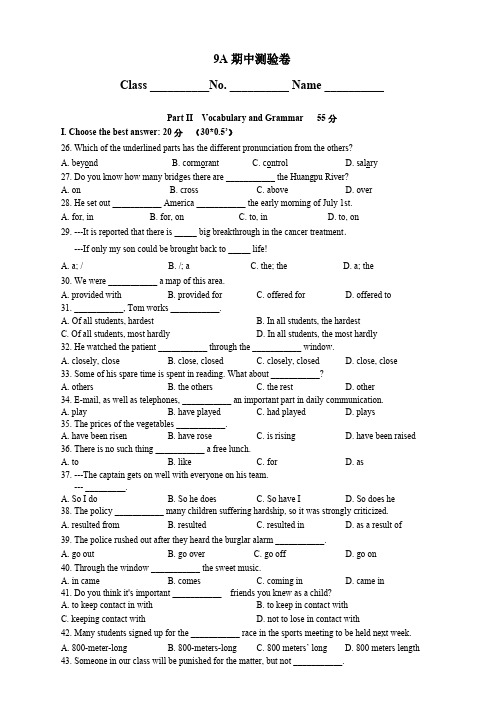
9A期中测验卷Class __________No. __________ Name __________Part II Vocabulary and Grammar 55分I. Choose the best answer: 20分(30*0.5’)26. Which of the underlined parts has the different pronunciation from the others?A. beyondB. cormorantC. controlD. salary27. Do you know how many bridges there are ___________ the Huangpu River?A. onB. crossC. aboveD. over28. He set out ___________ America ___________ the early morning of July 1st.A. for, inB. for, onC. to, inD. to, on29. ---It is reported that there is _____ big breakthrough in the cancer treatment.---If only my son could be brought back to _____ life!A. a; /B. /; aC. the; theD. a; the30. We were ___________ a map of this area.A. provided withB. provided forC. offered forD. offered to31. ___________, Tom works ___________.A. Of all students, hardestB. In all students, the hardestC. Of all students, most hardlyD. In all students, the most hardly32. He watched the patient ___________ through the ___________ window.A. closely, closeB. close, closedC. closely, closedD. close, close33. Some of his spare time is spent in reading. What about ___________?A. othersB. the othersC. the restD. other34.E-mail, as well as telephones, ___________ an important part in daily communication.A. playB. have playedC. had playedD. plays35. The prices of the vegetables ___________.A. have been risenB. have roseC. is risingD. have been raised36. There is no such thing ___________ a free lunch.A. toB. likeC. forD. as37. ---The captain gets on well with everyone on his team.--- _________.A. So I doB. So he doesC. So have ID. So does he38. The policy ___________ many children suffering hardship, so it was strongly criticized.A. resulted fromB. resultedC. resulted inD. as a result of39. The police rushed out after they heard the burglar alarm ___________.A. go outB. go overC. go offD. go on40. Through the window ___________ the sweet music.A. in cameB. comesC. coming inD. came in41. Do you think it's important ___________ friends you knew as a child?A. to keep contact in withB. to keep in contact withC. keeping contact withD. not to lose in contact with42. Many students signed up for the ___________ race in the sports meeting to be held next week.A. 800-meter-longB. 800-meters-longC. 800 meters’ longD. 800 meters length43. Someone in our class will be punished for the matter, but not ___________.A. you or IB. you and IC. you or meD. you and me44. Sorry I didn't hear what you ___________. Could you repeat it?A. talkedB. toldC. saidD. spoke45. ___________ are used to the life in Austria.A. The Jones’ familyB. The Jones familyC. JonesD. The Jones’46. To be great, you must be smart, confident, and, ___________, honest.A. thereforeB. above allC. at leastD. after all47. The ___________ is just around the corner and you won't miss it.A. gift’s shopB. gift shopC. gifts shopD. gifts’ shop48. __________ time went on, my father’s words proved true.A. WithB. AsC. WhenD. While49. Jenny hopes that Mr. Smith can suggest a good way to have her written English __________ in a short period.A. improveB. improvingC. to improveD. improved50. The underground is more convenient in Shanghai than __________ in Beijing.A. itB. /C. thoseD. that51. He knows ___________ knowledge of painting and music.A. a great number ofB. plentyC. large amounts ofD. great deal of52. ___________ exciting life is on the moon!A. WhatB. What anC. HowD. How an53. Could you tell me ___________.A. where he has been toB. where he had been toC. where he has goneD. where he had gone54. --- Lisa, let’s go to the airport at once. The plane is taking off.--- ___________. We still have 2 hours left.A. Take it easyB. Never mindC. Let’s goD. It doesn’t matter55. --- Must I pay for my cancel?--- ___________.A. Yes, you can.B. No, you mustn’t.C. Yes, you need.D. No, you needn’tII. Fill in the blanks with the given words in their proper forms: 7分56. You can discover the glorious ruins of __________ civilization.(Egypt)57. His speech is better than any other ___________ (program)58. The ox has four __________. (stomach)59. If you review your notes on textbook regularly, the material will become __________ and you will remember it longer. (mean )60. For complete__________, you can rent an apartment or house on your own. (depend)61.The three men were given work according to their __________ abilities. (respect)62. Many parents try their best to meet their children’s __________. (require)III. Fill in the blanks with the verbs in their proper forms: 6分63. The first modern Olympic Games ___________ in Athens in 1896 and only twelve nations participated. (hold)64. A cook will be immediately fired if he is found ___________ in the kitchen.(smoke)65. When I met Marco I __________ by his great dress sense. (strike)66. He hoped that he __________ behind in the mid-term examination. (not leave)67. Would you please ___________ your shoes on the floor? (not drop)68. The well-selling dictionary ___________ to in the lecture is available in many book stores. (refer) IV. Rewrite the sentences as required: 14分69. Only she can finish the task so perfectly. (保持句意基本不变)No one ___________ ___________ can finish the task so perfectly.70. The computer is made up of many different parts. (保持句意基本不变)The computer ___________ ___________many different parts.71. The noise of a car woke me up. (改为被动)I __________ __________ up by the noise of a car.72. We haven’t decided when and where to have the party. (改为被动)When and where to have the party ___________ ___________ ___________.73. It’s taken a long time to finish the work, ___________ ___________? (反义疑问句)74. The students look orderly in their uniforms. (对划线部分提问)___________ ___________ the students look like in their uniforms?75. He was so careless. He made the mistake. (保持句意不变)He made the mistake ___________ ___________ ___________ ___________ his ____________.V. Complete the following passage with the words in the box. 8分A. accessB. alternativesC. supportingD. confirmedE. conflictingF. separateG. functionH. innovativeI. prospectiveConsidering how much time people spend in offices, it is important that work spaces be well designed. Well-designed office spaces help create a corporation’s image. They motivate workers and they make an impression on people who visit and might be potential, or ____76____, customers. They make business work better, and they are a part of the corporate culture to live in.As we move away from an industrial-based economy to a knowledge-based one, office designers come up with ____77____ to the traditional work environments of the past. The design industry has moved away from a fixed office setup and created more flexible “strategic management environments.”These____78____ solutions are meant to support better organizational performance.As employee hierarchies (等级制度)have flattened or decreased, office designers’ response to this change has been to move open-plan areas to more desirable locations within the office and create fewer formal private offices. The need for increased flexibility has also been ____79____ by changes in workstation design. Office and work spaces often are not designed to a given person on a permanent basis. Because of changes to methods of working, new design allow for expansion or movement of desks, storage, and equipment within the workplace. Another important design goal is communication, which designers have improved by breaking the walls that _____80____ workstations. Designers have also created informal gathering places and upgraded employees’ ____81____ to heavily trafficked areas such as copy and coffee rooms.Corporate and institutional office designers often struggle to resolve a number of competing and often ____82____ demands, including budgetary limits, employees hierarchies and technological innovation (especially in relation to computerization). These demands must also be balanced with the need to create interiors (内饰) that in some way enhance, establish or possess a company’s image and will enable employees to ____83____ at their best.All these elements of office design are related. The most successful office designs are like good marriage—the well-designed office and the employees that occupy it are seemingly made for each other.Part III Reading & Writing 65分A.Choose the best answer: 5分(5*1’)Enough “meaningless drivel”. That’s the message from a group of members of the UK government who have been examining how social media firms like LinkedIn gather and use social media data.The House of Commons Science and Technology Committee’s report, released last week, has blamed firms for making people sign up to long incomprehensible legal contracts and calls for an international standard or kitemark to identify sites that have clear terms and conditions.“The term and conditions statement that we all carelessly agree to is meaningless drivel to anyone,” says Andrew Miller, the chair of the committee. Instead, he says, firms should provide a plain-English version of their terms. The simplified version would be checked by a third party and awarded a kitemark if it is an accurate reflection of the original.It is not yet clear who would administer the scheme, but the UK government is looking at introducing it on a voluntary basis. “We need to think through how we make that work in practice,” says Miller.Would we pay any more attention to a kitemark? “I think if you went and did the survey, people would like to think they would,” says Nigel Shadbolt at the University of Southampton, UK, who studies open data. “We do know people worry a lot about the inappropriate use of their information.” But what would happen in practice is another matter, he says.Other organizations such as banks ask customers to sign long contracts they may not read or understand, but Miller believes social media requires special attention because it is so new. “We still don’t know how significant the long-term impact is going to be of unwise things that kids put on social media that come back and bite them in 20 years’ time,” he says.Shadbolt, who gave evidence to the committee, says the problem is that we don’t know how compani es will use our data because their business models and uses of data are still evolving. Large collections of p ersonal information have become valuable only recently, he says.The shock and anger when a social media firm does something with data that people don’t expect, even if users have apparently permission, show that the current situation isn’t working. If properly administered, a kitemark on terms and conditions could help people know what exactly they are signing up to. Although they would still have to actually read them.84. What does the phrase “ meaningless drivel” in paragraphs 1 and 3 refer to?A. Legal contracts that social media firms make people sign up to.B. Warnings from the UK government against unsafe websites.C. Guidelines on how to use social media websites properly.D. Insignificant data collected by social media firms.85. It can be inferred from the passage that Nigel Shadbolt doubts whether _______.A. social media firms would conduct a survey on the kitemark schemeB. people would pay as much attention to a kitemark as they thinkC. a kitemark scheme would be workable on a nationwide scaleD. the kitemark would help companies develop their business models86. Andrew Miller thinks social media needs more attention than banks mainly because _______.A. their users consist largely of kids under 20 years oldB. the language in their contracts is usually harder to understandC. the information they collected could become more valuable in futureD. it remains unknown how users’ data will be taken advantage of87. The writer advises users of social media to _______.A. think carefully before posting anything onto such websitesB. read the terms and conditions even if there is a kitemarkC. take no further action if they can find a kitemarkD. avoid providing too much personal information88. Which of the following is the best title of the passage?A. Say no to social media?B. New security rules in operation?C. Accept without reading?D. Administration matter!B. Choose the words or expressions and complete the passage.14分Since finishing my studies at Harvard and Oxford. I’ve watched one friend after another land high-ranking, high-paying Wall Street jobs. As executives with banks, consulting firms, established law firms, and major corporations, many are now well on their way to impressive careers. By society’s standards they seem to have it made.On the surface, these people seem to be very lucky in life. As they left student life behind, many had a last drink at their cheap but friendly local bar, shook hands with longtime roommates, and moved out of small apartments into high buildings. They made reservations at restaurants where the cost of a bottle of wine ____89____ a college year’s monthly rent. They replaced their beloved old car with expensive new sports cars.The thing is, a number of them have ____90____ that despite their success, they aren’t happy. Some ____91____ of unfriendly coworkers and feel sad for eight-hour workweeks devoted to tasks they hate. Some do not respect the companies they work for and talk of feeling tired and ____92____. However, instead of devoting themselves to their work, they find themselves working to support the lifestyle to which they have so quickly become accustomed .People often speak of trying a more satisfying path, and in the end the idea of leaving their jobs to work for something they ____93____ or finding a position that would give them more time with their families almost always leads them to the same conclusion: it’s impossible. They have loans, bills, a mortgage to pay off , retirement to save for. They recognize there’s something ____94____ in their lives, but it’s hard to step off the track.In a society that tends to ____95____ everything in terms of dollars and cents, we learn form a young age to consider the costs of our decisions in financial terms. But what about the personal and social costs involved in pursuing money over meaning? These are exactly the kinds of us tend to ignore — and the very ones we need to consider most.89. A. shared B. paid C. equaled D. collected90. A. advertised B. witnessed C. admitted D. demanded91. A. complain B. dream C. hear D. approve92. A. calm B. guilty C. warm D. empty93. A. let out B. turn in C. give up D. believe in94. A. missing B. inspiring C. sinking D. shining95. A. measure B. suffer C. digest D. deliverCC. Read the passage and fill in the blanks with proper words. 14分It was 1961 and I was in the fifth grade. My marks in school were miserable and, the thing was, I didn’t know enough to really care. My elder brother and I lived with Mom in an ugly multi-family house in Detroit. We watched TV every night.But one day Mom changed our world f___96___. She turned off the TV. Our mother had only been able to get through third grade. But, she was much brighter and smarter than we boys knew at the time. She had n___97___ something in the suburban houses she cleaned---- books. So she came home one day, switched off the TV, sat us down and explained that her sons were going to make something of t___98___. “You boys are going to read two books every week,” she said. “And you’re going to write a report on what you read.”We moaned and complained about how unfair it was. B___99___, we don’t have any books in the house other than Mom’s Bible. But she explained that we would go where the books were: “I’ll drive you to the library.”So pretty soon there were these two peevish boys sitting in her white 1959 Oldsmobile on their way to Detroit Public Library. I wandered reluctantly a___100___ the children’s books. I loved animals, so when I saw some books that seemed to be about animals, I started leafing through them.The first book I read was about beavers(河狸). For the first time in my life I was l____101___ in another world. No television program had ever taken me so far away from my surroundings as did this verbal visit to a cold stream in a forest and these animals building a home.Now my elder brother is an engineer and I am chief of pediatric neurosurgery(儿童神经外科) at John Hopkins Children’s Center in Baltimore. Sometimes I still can’t believe my life’s journey, from a failing and indifferent student in a Detroit public school to this p___102___, which takes me all over the world to teach and perform critical surgery.But I know when the journey began the day Mom switched off the TV set and put us in her Oldsmobile for that drive to the library.D. Answer the questions: 12分Follow a strict way of lifeSelf-disciplined people are not all outstanding people. But nearly all outstanding people are self-disciplined people. Some of them read every day. Some of them never run late. The real difference between an elite person and an ordinary person is that an elite person can manage his or her time well. That’s where their success comes from. What people call self-discipline is in fact self-management.One example is staying fit. Never underestimate someone who is in good shape. Anyone who has ever tried to lose weight knows that it’s not easy. It’s even harder to avoid putting weight back on. If someone is in good shape, it shows that he knows the principles of staying fit and is able to stick to a plan that uses these principles.If someone is in good shape, it means that this person is good at managing themselves and their time. Whether it is natural or acquired, it is a great skill. It also shows that this person is able to keep persevering and can balance long-term goals with short-term goals.So if someone is in good shape, he or she is much more than just healthy.How do you learn self-management? First of all, set a goal and write down your reasons for wanting to achieve it. Create a list of all the things you need to do to achieve this goal and start to work on them one at a time. With self-discipline, small things in life will no longer trouble you. Only through self-discipline, can you _______________________________________. 103. Are all outstanding people self-disciplined people?_______________________________________________________.104. What’s the difference between an elite person and an ordinary person?________________________________________________________.105. Which is even harder to lose weight or to avoid putting weight back on?________________________________________________________.106. What does it mean if someone is in good shape?________________________________________________________.107. List one of the suggestions mentioned in the passage for starting self-management.___________________________________________________________.108. What can you do through self-discipline? Fill in the blank with your own words.___________________________________________________________.E. Writing 20分Write at least 60 words about the topic“My opinion on WeChat”.微信等社交软件已经成为人们生活中不可或缺的部分,有人认为它为人们的工作和生活带来了诸多便利,也有一些人认为它的出现弊远大于利。
精选2019-2020年新版-牛津上海版英语一年级上册复习巩固二十三
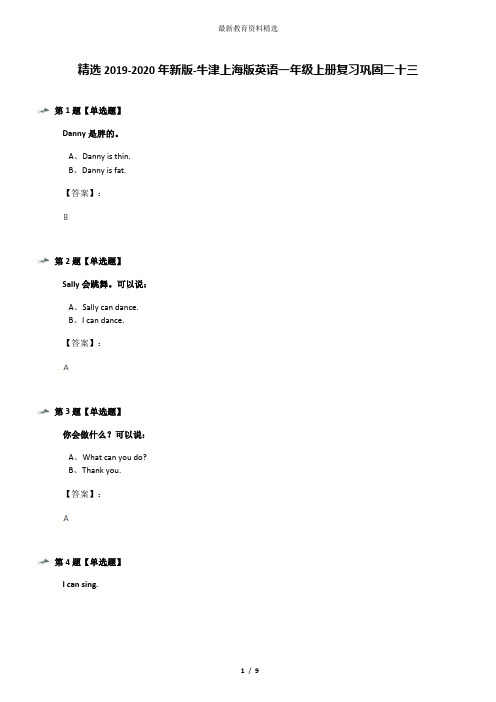
精选2019-2020年新版-牛津上海版英语一年级上册复习巩固二十三第1题【单选题】Danny是胖的。
A、Danny is thin.B、Danny is fat.【答案】:第2题【单选题】Sally会跳舞。
可以说:A、Sally can dance.B、I can dance.【答案】:第3题【单选题】你会做什么?可以说:A、What can you do?B、Thank you.【答案】:第4题【单选题】I can sing.A、B、【答案】:第5题【单选题】我会阅读。
可以说:A、I can dance.B、I can read.【答案】:第6题【单选题】这是我的同学。
她很高。
可以说:A、This is my friend. She"s fat.B、This is my classmate. She"s tall. 【答案】:第7题【单选题】选出相应的英文单词。
我A、IB、you【答案】:第8题【单选题】这是我的嘴巴。
A、This is my mouth.B、This is my mother. 【答案】:第9题【单选题】I can ____.A、singB、read【答案】:第10题【单选题】A、Yes. He"s my grandfather.B、Yes. He"s my father.【答案】:第11题【单选题】This is Amy. She"s my friend. She"s thin.A、B、【答案】:第12题【单选题】选择相应的英文。
给你。
A、Here you are.B、Give me a ruler, please.【答案】:第13题【单选题】你想告诉别人这是Danny, 应该说。
A、Is he Danny?B、He"s Danny.【答案】:第14题【单选题】你想问别人她是谁,应该说:A、Who is she?B、Who is he?【答案】:第15题【单选题】motherA、B、【答案】:第16题【单选题】I see my grandmother.A、B、【答案】:第17题【单选题】我会唱歌。
